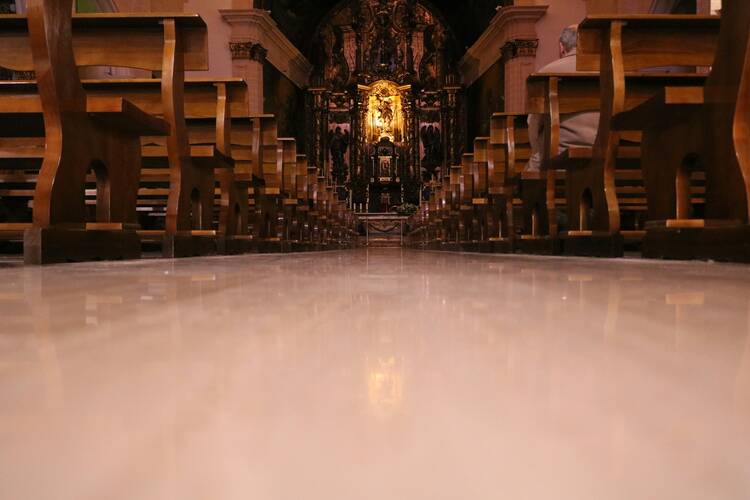A Reflection for Tuesday of the Thirteenth Week in Ordinary Time
As Jesus got into a boat, his disciples followed him.
Suddenly a violent storm came up on the sea,
so that the boat was being swamped by waves;
but he was asleep.
They came and woke him, saying,
“Lord, save us! We are perishing!”
He said to them, “Why are you terrified, O you of little faith?”
Then he got up, rebuked the winds and the sea,
and there was great calm.
The men were amazed and said, “What sort of man is this,
whom even the winds and the sea obey?” (Mt 8:23-27)
We’ve all been there, haven’t we? You’re stuck in a situation totally unfamiliar to you and you have no idea what you’re supposed to be doing. It could be anything from the first day at your new job or being at a party where you don’t know many people. A lot of these sorts of occasions will require improvisation, both physically and emotionally, to keep yourself balanced. Nervousness and anxiety may come but you have to be able to find a way to maintain control of yourself.
Growing up, I was never very good at improvisation. I liked it when things were set in stone. I liked knowing exactly what I was supposed to do before going into any situation. In other words, I always needed a battle plan. I loved English and history classes because there was certain knowledge I had to absorb and needed to extricate on the page; I hated science and math because I needed to understand the theories and apply them on the page, which, because there were unknowns, always made me feel like I was at a loss. The same principle applied outside of school; I preferred giving a scripted speech over having an extemporaneous conversation. I was a timorous child, and that nervousness would persist well into my college years. At some point, however, I discovered a fantastic trick that aided me in this whole improvisation thing.
David Mamet, the great playwright of the stage and screen, has an amazing line in his film “The Verdict,” which stars Paul Newman as a less-than-savory lawyer who, throughout the film, becomes a better man. Towards the end of the film, Newman’s character delivers the closing argument and a line from that scene stuck with me: “In my religion, we say ‘act as if ye had faith, faith will be given to you.’” Newman’s character essentially says “fake it ‘till you make it!”
This advice is very helpful, particularly for those who are not used to having faith in themselves—or even faith in God. Faith is a complicated thing, one that requires that we throw off rational boundaries and embrace uncertainty. It can be scary to do. Having faith is courageous (some might say foolhardy) but it is the cornerstone of Christianity; it is inherently a rebellious act.
One should rebel more, I think, if for no other reason than to keep oneself on their toes. After all, the early Christians were all rebels—rebels to the Roman authorities, to the Jewish religious establishment, rebels to everyone who thought they were just a bunch of crazy cultists. But look at where we are as a faith today and all because of this thing called faith.
In the reading from Matthew, the disciples’ lack of faith caused their bouts of fear and panic. They did not have sufficient faith in Jesus to calm themselves; they needed a show of his power to feel safe. But they shouldn’t have needed it in the first place. It might have been terrifying, even more so than facing the violent waves, to put their faith in this man who could calm a storm—but they were rewarded for it in the end.
It may not be easy but the next time you find yourself in a situation where anxiety might win out, just think: what would the bravest, most courageous version of yourself do? Act like that person and then see what happens. The first step in developing any sort of battle planis to have faith in yourself. And remember, God has faith in you too.








